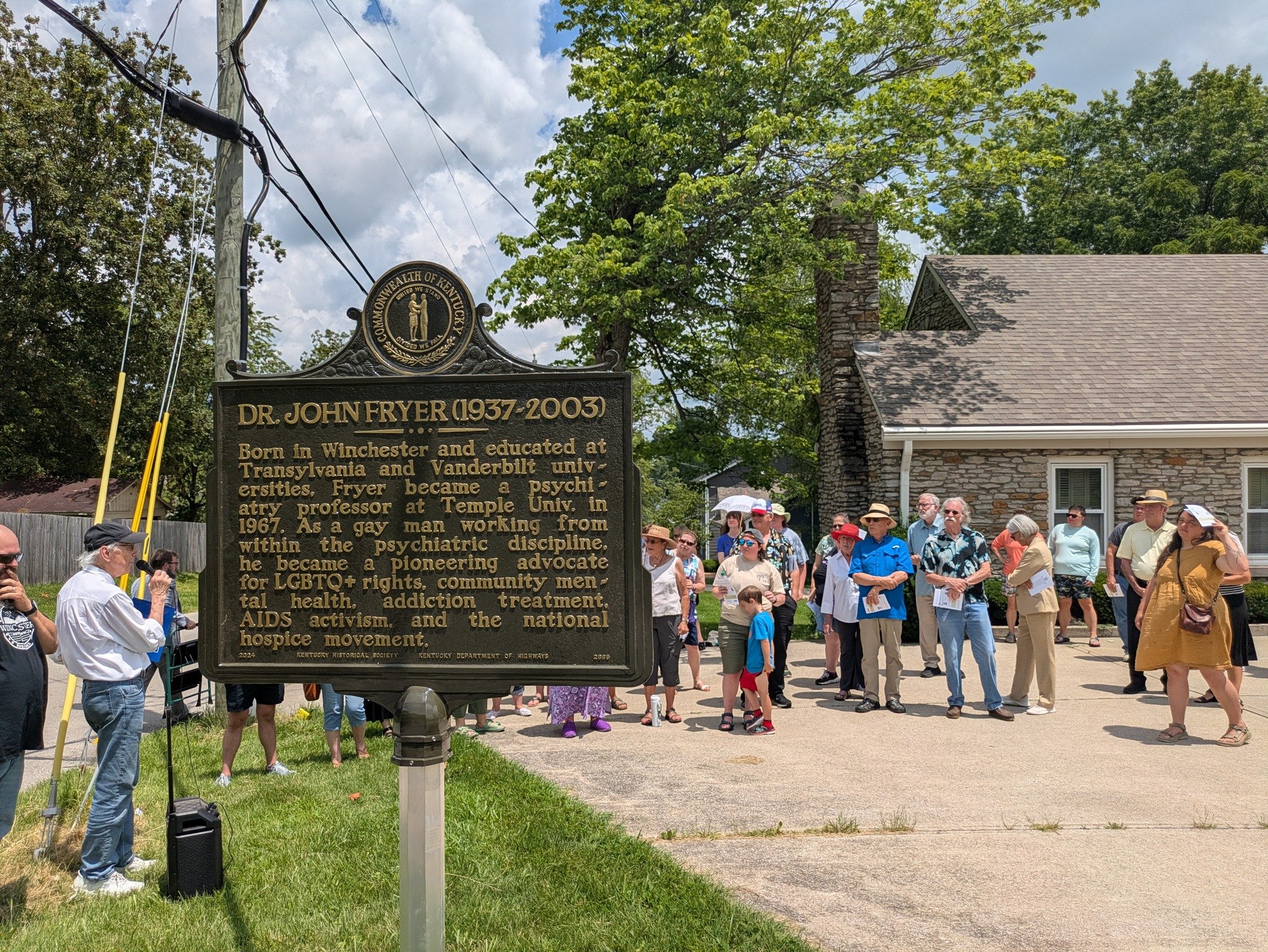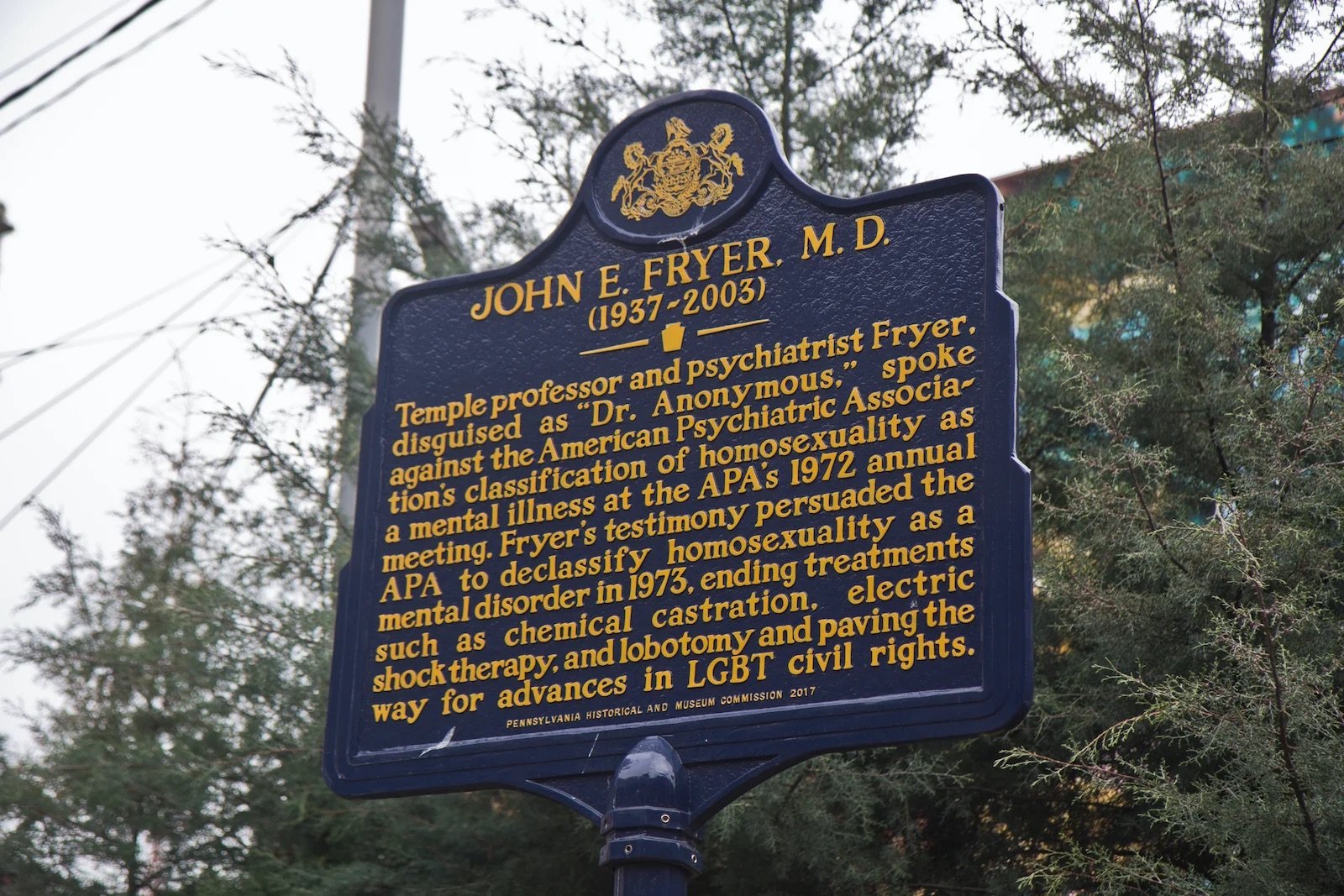Dr. Fryer’s Historic marker Unveiled in Winchester, KY
Remarks below were shared by Dr. Jonathan Coleman, Faulkner Morgan Archive, on the Dedication of Commonwealth of Kentucky Historic Marker #2669 in honor of Dr. John Fryer at 1117 West Lexington Avenue, Winchester Kentucky, on June 29, 2025
Good afternoon, everyone.
Today, we gather to honor Winchester’s native son, Dr. John Fryer: a quiet, unassuming, Kentuckian, who, although masked, helped to unmask a lie.
We are here to both celebrate and remember John as a truth-teller and a trailblazer who changed the course of history, not by shouting, not by grandstanding, but by being honest, at the right moment, in a trembling, disguised voice:
“I am a homosexual. I am a psychiatrist.”
These eight words, spoken in 1972 before the American Psychiatric Association, shattered a silence that had endured for too long. At that time, the medical profession still labeled homosexuality as a mental illness. Gay, lesbian, trans, bisexual people were treated, not just as outcasts and criminals, but as patients, as problems, as disorders to be cured or corrected.
Dr. Fryer stood before his peers—behind a rubber mask, wearing an oversized suit, using a voice modulator to disguise his identity—because he had to. He knew that speaking the truth might cost him his career, his safety, his freedom, and his future.
Yet he did it anyway.
He knew that sometimes, the truth must come first—even when the world isn’t ready to hear it.
And thanks to Dr. Fryer’s brave honesty, something shifted.
Within a year, the APA removed homosexuality from its list of mental disorders. It was a seismic change. One that began to dismantle decades—centuries—of stigma and shame. It was a moment that said, finally: being yourself is not an illness. Being honest is not a disorder. Loving who you love is not a diagnosis.
I am so proud to say that the man who helped ignite that change was a gay man from Winchester, Kentucky.
Because Dr. Fryer’s legacy is not just about changing a diagnosis.
It’s about changing what we believe is possible when we speak truth, even in fear. It’s about the moral courage it takes to stand up—not when the spotlight is warm, but when darkness is thick and the risks are real. It’s about the cost of authenticity in a world that often prefers, often demands conformity.
And yes, his legacy is about hope—hope that truth can change minds, that science can evolve, and that our society can evolve, too.
Today, we place this historic marker not just to remember a man—but to carry forward his voice. To say that the arc of history bends because of moments like this—because someone stood up, or sat down, or spoke out, when the world needed it most. To say that bravery may sometimes wears a mask, but it always tells the truth.
Dr. Fryer’s life, and now this marker, helps remind us: Truth is not a luxury. It’s a responsibility.
And to all who pass by this marker in the years to come—may you see not just the history, but the hope. May you be inspired to speak up for truth and justice, especially when silence is easier, and to know that even one voice—even a trembling voice—can change the world.
Thank you, Dr. Fryer. Thank you for being that voice, for your vision, and for your sacrifice. And thank you, Winchester, for raising such a remarkable man.
Kentucky State Highway Marker #2669
DR. JOHN E. FRYER (1937−2003)
Born in Winchester and educated at Transylvania and Vanderbilt universities, Fryer became a psychiatry professor at Temple Univ. in 1967. As a gay man working from within the psychiatric discipline, he became a pioneering advocate for LGBTQ+ rights, community mental health, addiction treatment, AIDS activism, and the national hospice movement.
“DR. ANONYMOUS”
In May 1972, at great personal risk, Dr. Fryer appeared in disguise at the national meeting of the American Psychiatric Association to declare his homosexuality and to denounce the APA’s longtime classification of homosexuality as a mental illness. His activism led to its removal from the APA’s Diagnostic and Statistical Manual of Mental Disorders in 1973.





